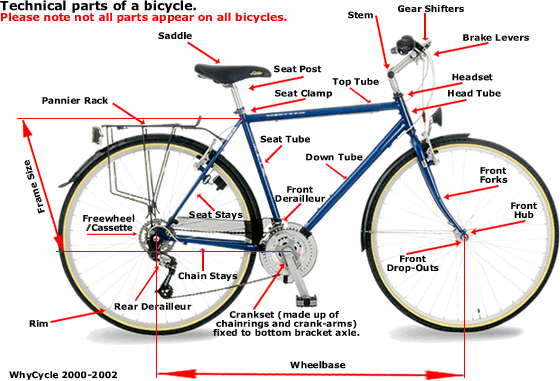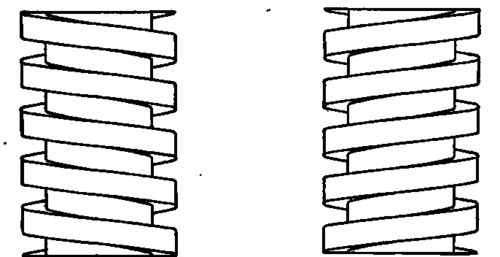Bike Maintenance Class: Difference between revisions
From HacDC Wiki
| Line 14: | Line 14: | ||
'''How to talk about gearing''' | '''How to talk about gearing''' | ||
Gears closer to the frame are referred to as ''inner'' gears while the ones furthest from the frame are the ''outer'' gears. High and low in relation to the gears describes the relative mechanical advantage of the gearing. An easy mnemonic for this is '''H'''igher gears are '''h'''arder while lower gears are easier. | Gears closer to the frame are referred to as ''inner'' gears while the ones furthest from the frame are the ''outer'' gears. High and low in relation to the gears describes the relative mechanical advantage of the gearing. An easy mnemonic for this is '''H'''igher gears are '''h'''arder while lower gears are easier. The inner gears on a bike are always going to be the lower gears and the outer gears are the higher gears. | ||
====Right-hand vs Left-hand Threading==== | ====Right-hand vs Left-hand Threading==== | ||
Revision as of 01:54, 7 March 2011
This page will summarize what was gone over in each class and have links to further reading.
Week 1: Introduction and Flat Repair
What was covered
Component Identification and Basic Terminology
Drive Side and Non-drive Side The right side of the bike is referred to as the drive side while the left side is the non-drive side.
How to talk about gearing Gears closer to the frame are referred to as inner gears while the ones furthest from the frame are the outer gears. High and low in relation to the gears describes the relative mechanical advantage of the gearing. An easy mnemonic for this is Higher gears are harder while lower gears are easier. The inner gears on a bike are always going to be the lower gears and the outer gears are the higher gears.
Right-hand vs Left-hand Threading
Almost every threaded component on a bike is going to be right-hand threaded, which means that turning it clockwise will tighten it and turning it counter-clockwise will loosen it. Pedals and bottom bracket cups are examples where you would run into left-hand threaded components. To identify the handedness of a component hold it in front of you as in the picture below. The direction that the threads slant up too corresponds to the components handedness.
Left-handed Right-handed
Cleaning and lubing the chain
Flat Repair
- Understanding brake and wheel quick release mechanisims
- How to remove a tire with tirelevers
- Identifying puncture source (don't forget to keep everything lined up!)
- Patching
Hands On
Repairing flat tires on demo wheels.
Resources
More than you really need to know: Sheldon Brown Tells All


